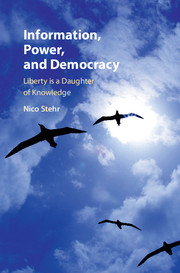Book contents
- Frontmatter
- Contents
- List of figures
- List of tables
- Introduction
- 1 Coming to terms
- Excursus: How much knowledge does democracy need, and how expensive should it be?
- 2 Accounts of the conditions for the possibility and the resilience of liberty
- 3 The economic order ensures (defeats) liberty
- 4 Scientia est libertas
- Excursus: An inconvenient democracy: knowledge and climate change
- Knowledge and democracy: summary and conclusions
- Bibliography
- Index
4 - Scientia est libertas
from Excursus: How much knowledge does democracy need, and how expensive should it be?
Published online by Cambridge University Press: 05 December 2015
- Frontmatter
- Contents
- List of figures
- List of tables
- Introduction
- 1 Coming to terms
- Excursus: How much knowledge does democracy need, and how expensive should it be?
- 2 Accounts of the conditions for the possibility and the resilience of liberty
- 3 The economic order ensures (defeats) liberty
- 4 Scientia est libertas
- Excursus: An inconvenient democracy: knowledge and climate change
- Knowledge and democracy: summary and conclusions
- Bibliography
- Index
Summary
[It] is intensely desirable and under certain conditions practicable that all human beings become scientific in their attitudes … It is desirable because this attitude forms the sole ultimate alternative to prejudice, dogma, authority, and coercive force exercised in behalf of some special interest.
John Dewey ([1938] 1955:38)[T]he social sciences tend, not to restrict personal liberty, but rather to expand the domain of free choice by clarifying the rational alternatives.
Daniel Lerner (1959:31)If one imagines in a thought experiment that science could or should serve as the model for democratic governance, two basic possibilities open up that may serve such a societal function of the scientific community. On the one hand, and as John Dewey anticipates, the hope would be that the fruits of science might be a motor for advancing democratization based on the persuasive and exemplary forms of the rational knowledge science generates and its successive, broad dissemination throughout society. Similarly, Daniel Lerner assigns to the (social) sciences an “emancipatory” role in society. Social science knowledge is seen to broaden, not restrict, the field of free choice open to the members of society. More specifically, the social sciences offer views of the range of possible courses of action by clarifying available rational alternatives in an objective manner.
On the other hand, the alternative perspective stresses the exemplary nature of the scientific community as a democratic organization that serves as a model for societal governance – based also on the idea that science and democracy share specific epistemological commitments (see Dahrendorf, [1963] 1968:254–255). Robert K. Merton's ethos of science, which I will explicate in this section, refers to exactly this nexus between morality and the benefits of scientific work that offers itself as an ideal for the choice of the desired form of governance.
In the first case, and in the end, society's citizens literally become model scientists and carriers of scientific knowledge that throughout society has managed to displace all other, inferior – that is, traditional and everyday forms – of knowledge. But there is also a possible downside: The prospect of the excessive dependence of society and politics on scientific knowledge can seriously undermine the liberty of individuals and their ability to participate in democratic governance and effectively control the conduct of the state apparatus.
- Type
- Chapter
- Information
- Information, Power, and DemocracyLiberty is a Daughter of Knowledge, pp. 162 - 191Publisher: Cambridge University PressPrint publication year: 2015



